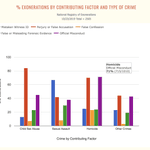
A Louisiana prisoner wrongfully prosecuted for capital murder has agreed to a plea deal that secures his freedom after spending 42 years in prison for a crime he says he did not commit. With the assistance of the Innocence Project New Orleans, Elvis Brooks (pictured) succeeded in overturning his 1997 conviction and agreed to plead guilty to lesser charges in exchange for his release on October 15, 2019.
Taking the plea was “something I [didn’t] want to do, but I wanted my freedom.” Brooks said. “I’ve been locked up since ’77. I’m not getting any younger. I’d like to get out.”
Brooks was arrested when he was 19 years old and faced the death penalty on charges that he murdered a bar patron during an armed robbery. He was convicted and sentenced to life in prison in a trial that lasted less than one day. No physical evidence linked Brooks to the murder and he presented twelve alibi witnesses who testified that he was elsewhere when the murder occurred. The sole evidence against him came from cross-racial identifications by three white strangers who had been inside the dimly lit bar during the crime and who picked out a photograph of Brooks, who is black, from a police photo array.
Later investigation into the case by the Innocence Project New Orleans uncovered two major items of exculpatory evidence that prosecutors had withheld from the defense at the time of Brooks’ trial. Fingerprints from the perpetrators had been recovered from two beer cans at the bar, but they did not match Brooks. A prosecutor had written a note about the fingerprint results — indicating that the prosecution had direct knowledge of the evidence when it did not disclose it to the defense, in violation of Brady v. Maryland. Police had also investigated a related robbery that took place less than a block away immediately before the bar robbery, but prosecutors failed to disclose that two black witnesses to that crime had been shown a picture Brooks and did not identify him as the perpetrator.
Studies have found that cross-racial eyewitness identifications are less reliable than identifications within racial groups. According to Innocence Project New Orleans, 29 of Louisiana’s 57 exonerations have involved eyewitness misidentification. The National Registry of Exonerations reports that, as of October 2019, 25% of homicide exonerations nationwide involved mistaken witness identifications. Mistaken identifications have contributed to seven of Louisiana’s 11 death-row exonerations. 71% of homicide exonerations nationwide and all 11 in Louisiana involved some form of official misconduct.

Brooks agreed to plead guilty to manslaughter and three counts of armed robbery in exchange for his immediate release. Although he maintains his innocence in the crime, his plea deal blocks him from a full exoneration or any compensation from the state for his 42 years of wrongful incarceration. “Mr. Brooks never sought a plea agreement. It is deeply unfair that an innocent man would be forced to choose between entering a plea to secure his immediate freedom and waiting years more in prison to prove his innocence through litigation,” said Charrel Arnold, his attorney from Innocence Project New Orleans. “This situation is particularly unfair given that the state has known about the new evidence presented in this case since 1977.”
Orleans Parish District Attorney Leon Cannizzaro maintained that his office “did nothing then or now to deprive this defendant of a fair trial.”
Brooks’ brother, Gregory, rejected suggestions that Brooks had committed the murder. “I don’t believe he is innocent — I know he is,” Gregory Brooks said. Arnold described Brooks’ choice to accept the prosecution’s plea offer “an incredibly difficult decision [that] was entirely up to him.… Mr. Brooks is already 62 years old and has spent his entire adult life in prison. The opportunity to get out was paramount to him.”
Arnold called Louisiana “one of the incarceration capitals of the world and a hotbed for wrongful convictions. That said, there are likely many wrongful convictions and people serving time for crimes they didn’t commit, and we may never know.” Both official misconduct and mistaken witness identifications were factors in the cases of Johnny Ross, Curtis Kyles, Shareef Cousins, and John Thompson, the four death-row exonerees prosecuted in Orleans Parish.
Elvis Brooks, Innocence Project New Orleans, October 15, 2019; John Simerman, After decades of maintaining innocence, Elvis Brooks to be freed under deal; ‘I wanted my freedom’, Nola.com, October 15, 2019; Janet McConnaughey, After 42 Years in Prison Protesting His Innocence, New Orleans Man Being Freed in Plea Deal Bargain, TIME, October 16, 2019; Dara Sharif, Innocence Project New Orleans: A Man Wrongly Imprisoned for 42 Years Is Forced to Trade the Truth for His Freedom, The Root, October 17, 2019. Photo courtesy of the Innocence Project New Orleans. Pictured, left to right, Innocence Project New Orleans investigator Jack Largess, Aaron Brooks, Elvis Brooks, Charell Arnold.



